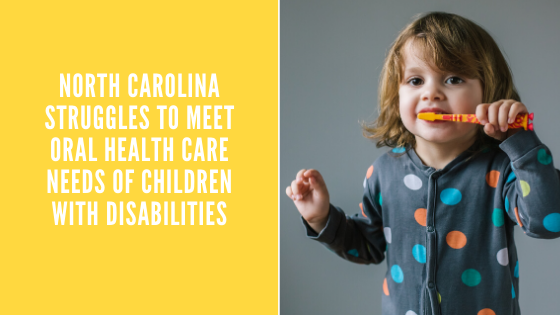Children with disabilities are almost two times worse off with meeting their oral health care needs than kids without disabilities. And, according to the American Dental Association, both North Carolina and South Carolina are in the bottom third of the country when it comes to the number of dentists per resident to help these kids!
In fact, North Carolina ranks 47th in the country in the number of dentists per person — and some of our counties don’t have any dentists at all!
It is no wonder that 13% of just kindergartners in the state have untreated tooth decay. And it is not just their teeth that suffer. Children with poor oral health are three times as likely to miss school because of dental pain.
February is National Children’s Dental Health Month and we want to share some info with parents of children with disabilities. Sponsored by the American Dental Association, this observance is supposed to bring together thousands of dedicated professionals, healthcare providers, and educators to promote the benefits of good oral health to children, their caregivers, teachers, and many others.
Children’s Dental Heath Disabilities
Let’s start with the special needs that get in the way of dental health. The Academy of Pediatric Dentistry defines special needs children as those with chronic physical, developmental, behavioral or emotional conditions where limitations on daily activities require even more dental and medical services.
- Cleft lip or palate
- Down syndrome
- neurological disorders
- cerebral palsy
- vision and hearing impairments
.
For example, Down syndrome and other genetic disorders can cause delays in tooth eruption, sometimes up to two years according to the National Institute of Dental and Craniofacial Research.
What does that mean exactly? Kids with Down syndrome could have malformed or extra teeth erupt, or congenitally missing teeth. That could lead to crowding and poor alignment. Sadly that opens the door to gum disease and tooth decay because it makes it harder for kids to keep their teeth clean.
What Can Parents of Children with Dental Disabilities Do
The Vanderbilt Kennedy Center (VKC) in Nashville, TN works with and for people with disabilities and their family members, service providers and advocates, researchers and policymakers. It has prepared an excellent oral health guide for children with disabilities. Check out this link. https://vkc.mc.vanderbilt.edu/assets/files/tipsheets/oralhealthtips.pdf
But even more helpful and more exciting is a development from late last year.
The Duke Endowment and the Blue Cross and Blue Shield of North Carolina Foundation and its foundation in South Carolina revealed plans to invest $35 million in initiatives and projects in the bordering states which willi integrate dental and medical care.
School-based health programs will be funded in rural and underserved areas— like the ones with no dentists— where the children can learn proper oral methods, have their teeth cleaned, get sealants painted on them, and other ways to help prevent decay.
And if you are a parent of a child with disabilities struggling with oral health care problems, consider checking out Safety Net Dental Clinics. These are non-profit dental facilities where low-income families or individuals can go for dental care. Most clinics accept insurance, N.C. Medicaid and N.C. Health Choice for Children. Many of these clinics also provide services on a sliding-fee scale to low-income patients who have no dental insurance. There are Safety Net Dental Clinics in most of North Carolina’s 100 counties.
This post was written by Anthony M Scialis. Find him here.

